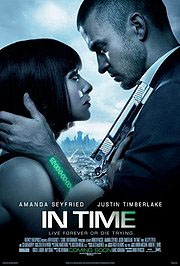 Remember Logan’s Run?
Remember Logan’s Run?
Me neither; just a few scattered impressions from when I was a kid and it was on TV. I recall it being about a futuristic society where people were killed off at 30, their expiration date announced by some kind of colored device on their hand.
In Time trades in a variant of that premise: in the future, science has somehow made it so that people stop aging at twenty-five. Humans, however, still make babies and in a world where no one dies except through fatal accidents, people would eventually be packed on this little blue sphere like sardines. Society’s solution is stamp a digital clock on everyone’s arm that starts ticking at 25, counting down a year. Since it’s possible to put more time on the clock, a person could theoretically live forever. Run out of time, however, and it’s Deadsville for you. Time, not money, is now the most important commodity.
It’s the future and ugly-ass buzz cuts are still in style. No wait, they’re not, but Will Salas (Justin Timberlake) sports one anyway, presumably to drive home the fact that he and his mother Rachel (Olivia Wilde), are poor. Will and Rachel make plans to celebrate her 50th birthday and she shares some time with Will so that he can have lunch.
Will heads for the factory where he makes canisters that hold time. On the way, he shares some time with a street urchin. (Hint: that’s so you’ll know he’s a good guy.) When he stops to get a cup of coffee, he finds that the price has gone up–again. Then, as he’s clocking out and getting his time pay, he’s told that his pay’s gone down. Thus is the life of the working poor in this new society. Pretty much the same as it’s always been, except people are much prettier.
Like any other working schlub, Will heads to the pub to drown his sorrow, where he sees a man buying everyone round after round of drinks. The man, Henry Hamilton (Matthew Borner), is a fat cat slumming it in the ghetto and risking the attention of the Minutemen, a gang of time thieves. Will rescues the Henry from the Minutemen, unaware that Henry doesn’t want to be rescued. Living forever isn’t all it’s cracked up to be, and Henry is trying to commit suicide. Henry tells Will that the rich are living off stolen time, siphoned from the poor through exorbitant loans, rents, and cost of living increases. “For a few to be immortal, many must die.”
Later, when Will is asleep, Henry passes Will nearly all his time–a century–leaves him a note (“Don’t waste my time”), and dies. Flush with his new wealth, Will shares some with a friend and then goes to meet his mother. Except Mom is down to her last 90 minutes and the bus ride home now costs two hours. She tries to run home, but her clock runs out just before she can reach Will and he can share his time. Distraught, Will visits his friend, only to find that his buddy, flush with a whole decade, gambled himself to death.
With nowhere else to go, he heads for the gated world of the rich. There he spends a day sleeping (a luxury when you have to make every minute count) in a luxury hotel, winning a high stakes game of poker with millionaire Phillip Weis (Vincent “Hey, it’s Conner from Angel!” Kartheiser), and later partying at Phillip’s mansion.
Will’s good times come to an end when Raymond Leon (Cillian Murphy), a Timekeeper, crashes the party and tries to arrest Will. Upward mobility doesn’t happen for guys like Will, and Raymond suspects foul play. Will escapes, using Phillip’s daughter, Sylvia, as a hostage. And thus begins the Bonnie and Clyde/Robin Hood segment of the movie….
Interestingly, the critics panned In Time. But then, they also panned Equilibrium, another dystopian film that I liked. *Shrugs* Of the two, I think Equilibrium is the stronger movie, but I’ve a fondness for storylines that address societal injustice. In addition to the vampiric nature of the rich, In Time also addresses the fact that the criminal element’s predations fall heaviest on the poor, essentially keeping them down from within.
My biggest complaint is–no surprise here–characterization–particularly Olivia, Phillip’s spoiled daughter, who makes the transition from princess to bank robber a little too smoothly. Then there’s the fact that time isn’t just money, it’s life. Run out of money and you may go hungry for a day or so. Run out of time and you die. Kaput, finito. The ease with which people accept time theft, both from their peers and the rich, seems a little unlikely.
But given the dreary narratives that generate critics’ praise (*cough, Black Swan*), In Time is at least action-packed and fronted with serviceable acting (although Cillian Murphy’s raw-boned good looks are getting a little too raw to pass for 25).
In Time is an imperfect but entertaining SF allegory of economic disparity.


